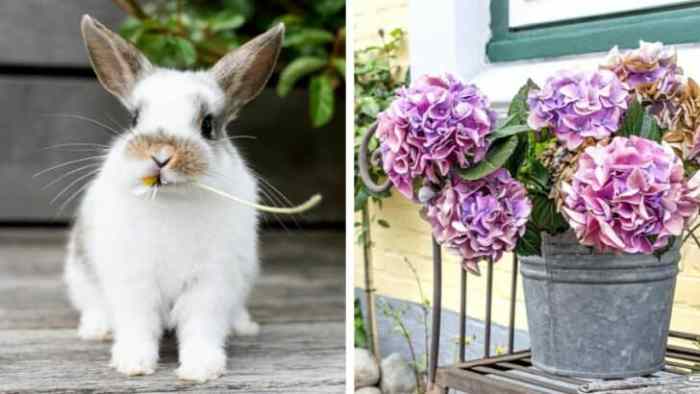Hydrangeas are popular garden plants known for their beautiful blooms. However, these plants can be toxic to rabbits, raising concerns among rabbit owners. This article delves into the toxicity of hydrangeas to rabbits, their consumption habits, alternative food sources, and measures to prevent and treat hydrangea poisoning.
Rabbits are herbivores with specific dietary needs. Understanding their feeding behavior and the potential risks associated with certain plants is crucial for their well-being. This article provides comprehensive information on the topic, empowering rabbit owners to make informed decisions and ensure the safety of their beloved pets.
Toxicity of Hydrangea Plants
Hydrangea plants contain toxic compounds called cyanogenic glycosides, which release cyanide when ingested. Cyanide is a potent toxin that can cause severe health problems and even death in rabbits.
The toxicity of hydrangea plants varies depending on the species. Some species, such as Hydrangea macrophylla (bigleaf hydrangea) and Hydrangea paniculata (panicle hydrangea), are more toxic than others. The leaves and flowers of hydrangea plants contain the highest concentrations of cyanogenic glycosides.
Symptoms of Hydrangea Poisoning in Rabbits
The symptoms of hydrangea poisoning in rabbits can include:
- Vomiting
- Diarrhea
- Lethargy
- Difficulty breathing
- Seizures
- Death
If you suspect that your rabbit has ingested hydrangea, it is important to seek veterinary attention immediately.
Consumption Habits of Rabbits
Rabbits are herbivorous mammals whose primary food source is vegetation. Their feeding habits are influenced by various factors, including age, health, and environment.
Young rabbits primarily consume their mother’s milk for the first few weeks of life. As they mature, they gradually transition to a plant-based diet. Adult rabbits have a diverse diet that includes grasses, hay, leaves, twigs, bark, and certain vegetables and fruits.
Food Preferences and Aversions
Rabbits have a strong preference for certain types of vegetation, such as fresh, green grasses and leafy plants. They also enjoy vegetables like carrots, celery, and leafy greens. However, they avoid consuming plants that are toxic to them, such as nightshade, hemlock, and foxglove.
Dietary Changes
The dietary needs of rabbits can change depending on their age, health, and environment. For instance, pregnant or nursing rabbits require a higher intake of nutrients to support their offspring. Similarly, rabbits living in colder climates may need to consume more food to maintain their body temperature.
Consumption of Hydrangea Plants
While hydrangea plants are not a typical food source for rabbits, they may occasionally consume the leaves or flowers. This behavior is more likely to occur if other preferred food sources are scarce. However, it is important to note that hydrangea plants contain glycosides, which can be toxic to rabbits in large quantities.
Alternative Food Sources for Rabbits

Rabbits are herbivores with a diverse diet that includes various plant materials. While hydrangeas are toxic to rabbits, there are numerous safe and nutritious alternatives that can provide them with the essential nutrients they need.To ensure a balanced diet for rabbits, it is crucial to offer a variety of food sources from different categories.
These include:
Fruits
* Apples (remove seeds)
- Bananas (small amounts)
- Blueberries
- Cranberries
- Raspberries
- Strawberries
Vegetables
* Asparagus
- Broccoli
- Carrots
- Celery
- Collard greens
- Dandelion greens
- Kale
- Mustard greens
- Spinach
Hay
* Timothy hay (primary source)
- Orchard grass hay
- Meadow hay
Pellets
* Choose high-quality pellets specifically formulated for rabbits
Follow the manufacturer’s instructions for feeding amounts
It is important to note that some vegetables, such as lettuce and cabbage, can cause digestive issues in rabbits and should be offered in moderation. A balanced diet should provide rabbits with the necessary fiber, protein, vitamins, and minerals to support their overall health and well-being.
Prevention and Treatment of Hydrangea Poisoning
Preventing rabbits from accessing hydrangea plants is crucial. Keep the plants out of their reach by fencing them off or placing them in hanging baskets. Supervise rabbits when they are outdoors to prevent them from ingesting the leaves or flowers.If
a rabbit ingests hydrangea, immediate action is necessary. Contact a veterinarian promptly and provide them with information about the plant ingested and the amount consumed. Induce vomiting to remove any remaining plant material from the rabbit’s stomach. Activated charcoal may be administered to absorb toxins.Treatment
for hydrangea poisoning involves supportive care, such as providing fluids to prevent dehydration and administering pain medication. In severe cases, hospitalization and intravenous fluids may be required. The prognosis for rabbits that ingest hydrangea depends on the amount consumed and the promptness of treatment.
Closing Summary
In conclusion, hydrangeas can be toxic to rabbits due to the presence of cyanogenic glycosides. While rabbits may not naturally consume hydrangeas, they can develop a taste for them or ingest them accidentally. Providing rabbits with a balanced diet and preventing access to toxic plants is essential for their health.
If hydrangea poisoning occurs, immediate veterinary attention is crucial. By understanding the risks and taking appropriate precautions, rabbit owners can ensure the well-being and longevity of their furry companions.
Questions and Answers
Can all types of hydrangeas harm rabbits?
Yes, all species of hydrangeas contain cyanogenic glycosides, making them potentially toxic to rabbits.
What are the symptoms of hydrangea poisoning in rabbits?
Symptoms include vomiting, diarrhea, difficulty breathing, weakness, and seizures.
What should I do if my rabbit ingests hydrangeas?
Seek immediate veterinary attention. Induce vomiting only if instructed by a veterinarian.
What are some safe and nutritious food sources for rabbits?
Safe options include hay, fresh vegetables (e.g., carrots, celery), fruits (e.g., apples, bananas), and rabbit pellets.
How can I prevent my rabbit from eating hydrangeas?
Keep hydrangeas out of reach, use fencing or netting, and provide alternative food sources.